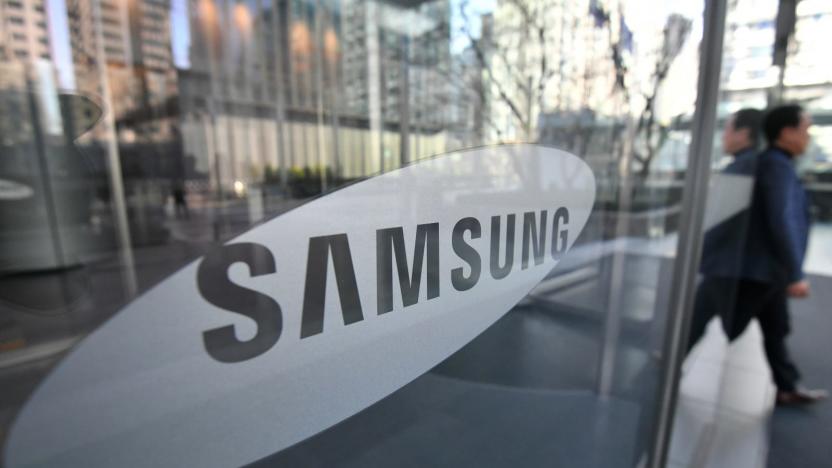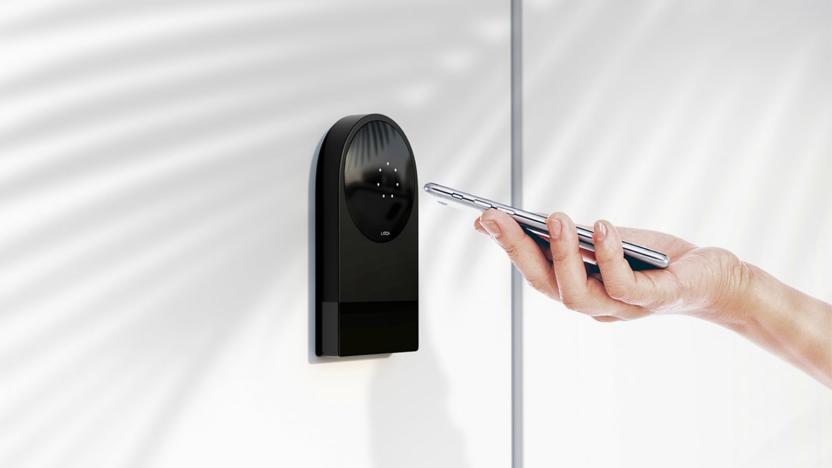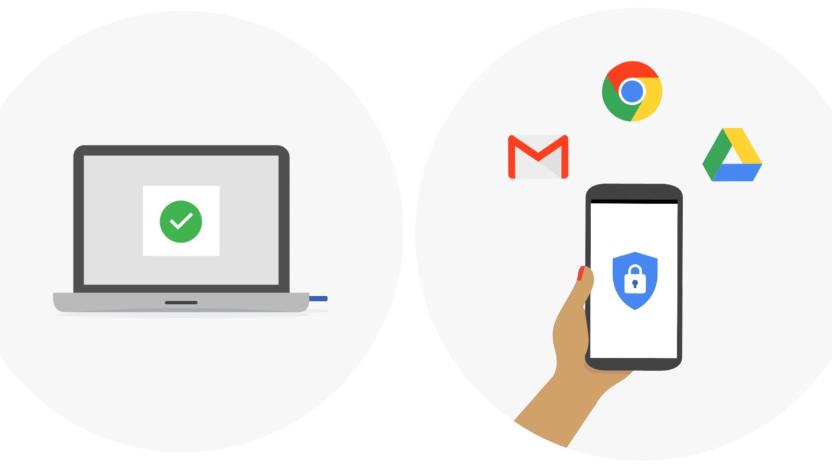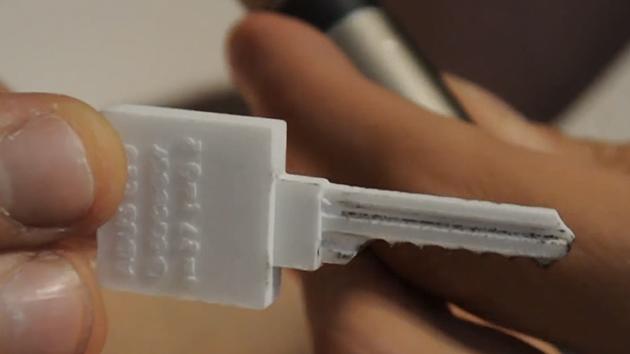keys
Latest

iFixit's MacBook Air teardown confirms 0.5mm thicker keyboard
If you've been lucky enough to get your hands on the new MacBook Air, you know that the keyboard really is excellent. Thanks to the scissor mechanism, which replaced the hated butterfly keyboard, the keys are noticeably cushier, with more travel. iFixit took a closer look at those keys in its latest teardown and reports that the height difference is about 0.5 millimeters.

Analyst: Apple will soon ditch its butterfly keyboard design
After years of controversy and technical difficulties, Apple could be about to give up on the butterfly mechanism keyboard in its MacBooks. According to a report authored by Apple analyst Ming-Chi Kuo -- who has a decent record in accurate Apple predictions -- the company is on track to release a refreshed MacBook Air later this year, this time with a keyboard design based on scissor switches.

Samsung leak exposed source code, passwords and employee data
Samsung was reportedly leaking sensitive source code, credentials and secret keys for several internal projects. According to TechCrunch, independent security researcher Mossab Hussein discovered dozens of exposed files in a GitLab used by Samsung engineers and hosted on a company-owned domain. The projects were reportedly set to "public" and not protected with a password.

Tenants win right to have physical keys in NY smart lock case
The landlords of one Manhattan apartment building have agreed to provide physical keys to tenants who don't want to use smart locks. The decision was reached in a preliminary settlement after tenants sued their landlord for installing Latch smart locks last year. As CNET reports, this marks one of the first times legal professionals have had to weigh in on how landlords can use smart home technology.

Steam's curator update tackles shady review key requests
Steam's curator program will be getting a makeover this fall as Valve takes steps to make the system more effective for both gamers and developers. Under the banner "Curator Connect," players will now see their favorite curators' recommendations show up in other parts of the Steam Store, as well as their home page. Curators will also be able to embed videos in their reviews, create lists from reviews they've already written, have more control over their home page and get their hands on more data showing the impact their reviews have on their followers' buying habits.

Google’s physical authentication keys are effective but limited
Two-step authentication has been the standard for securing access to online accounts for most tech companies. Google rolled it out users in 2011 and has been steadily making improvements to the system to make it easier for us all to use it. Now, the rumored physical keys that are supposed to replace Google's two-factor verification for highly vulnerable targets are apparently here. The New York Times tested the tech company's Advanced Protection Program, which requires two physical keys to log in to a Google account. The site found that while the new program is effective, it does not yet support third-party apps that access Google information.

Use this app to find your keys like you find your Pokémon
We've seen Bluetooth item trackers before, like Tile and Protag's Duet, but they're usually pretty dull. Pixie, on the other hand, will curb the anxiety of losing something by turning it into a game. Like other trackers, Pixie uses Bluetooth, but it also adds augmented reality into the mix, so your phone will actually show you where the general area where your device is. Once you get in real close, it'll start pointing you left and right like a good old-fashioned game of hot and cold. You could also use it to cheat at hide and seek with your kids.

G2A attempts to appease game publishers with royalty payments
After coming under fire for how it handles sales of illegal video game keys, reselling website G2A has introduced a number of new policies that it hopes will appease developers affected by the practice. The company announced that it will let game makers apply for royalty payments for any titles that appear on its marketplace. It comes after SpeedRunners publisher TinyBuild accused G2A of failing to act on $450,000 in potential lost sales, after scammers used stolen credit cards to buy legitimate keys and auction them off for profit.

TSA inadvertently shows the dangers of master baggage keys
Security researchers have long warned of the dangers of using master-keyed locks -- if thieves get their hands on just one key, they compromise all of the compatible locks at the same time. And unfortunately, the US' Transportation Security Administration is learning this lesson the hard way. It briefly let the Washington Post show a photo (we've blurred the details) of the master baggage keys it uses for approved locks, giving crooks a crude guide to making duplicates. And you can't just switch to a non-standard lock to get around this, since TSA agents will rip it off if they catch it during an inspection.

The creator of the gTar returns with a teach-yourself keyboard
The first time you played Guitar Hero (or Rock Band), you probably wished that someone would invent a real guitar that could teach you how to play in the same manner. Shortly afterward, the gTar was invented, that showed budding riff-makers how to shred thanks to a series of helpful LEDs embedded in the neck. All you had to do was place your fingers on the strings where the lights lit up and, hey presto, you were a rock god. Now, the company behind the gTar is back, and has taken the same idea, but applied it to a piano, in the form of Keys.

3D-printed 'bump keys' are a tech-savvy lockpicker's best friend
We've all locked ourselves out of our homes or offices at least once, but what do you do when there aren't any handy spare keys laying around? Well, seeing as how we live in the future, you could always 3D print one. Printing a plastic replica of a key you've already got in your possession is a piece of cake, but the real trick for the curious and the criminal alike is figuring out how to print a key that'll open locks without having an original key on hand. Wired spoke to a pair of lockpickers who did just that -- with just a photo of a keyhole, some understanding of the lock's depth and a bit of crafty purpose-built software called Photobump, security consultants Jos Weyers and Christian Holler can print so-called "bump keys" that allow them to jimmy open nearly any lock with just a bit of elbow grease.

Starwood swapping room keys for mobile phones at two hotels
Starwood plans to roll out refreshed SPG apps that can unlock your guest room later this quarter. The new tech, which the company refers to as "keyless key" in its intro video (embedded after the break), will soon let you bypass the front desk and enter your room using an Android 4.3 or iPhone 4s (or newer) device at the Aloft Harlem and the Aloft Silicon Valley. Existing locks must be upgraded in order to communicate with the Android and iOS apps via Bluetooth, according to a WSJ report, but Starwood's CEO says that the "investment would not be substantial." Starwood currently offers a Smart Check-In solution at several Aloft hotels, but the existing system requires guests to obtain (and carry) a compatible membership card. It's also quite limited, with only nine hotels currently participating. Meanwhile, if this initial smartphone rollout is a success, your phone could be the key to all W and Aloft hotels worldwide by the end of next year.

Okidokeys gives you more options than you could ever possibly need to open your front door
We first got word of the Okidokeys smart lock system roughly an hour ago, and just now got a chance to see the thing in action -- well, we got a chance to see it in various states of disarray on a table at tonight's CES Unveiled event. The primary module hooks up to the lock on the inside of door, with no trace of the mechanism visible from the outside. Trigger it via your mobile device and it rotates to unlock the door. There's also a large button you can use to unlock it sans smartphone from the inside. The system starts at $179. There's also a bundle priced somewhere in the mid-$200s, which will get you an RFID reader. The reader doesn't attach directly to the module, so you can put it anywhere on the exterior of the house to unlock via a bracelet or card you keep in your wallet. Or, if you're so inclined, you can still use your old-fashioned key. Using the Android or iOS app, you can also unlock the door remotely and grant access to users. The sets are available for pre-order now, with shipping set for spring. The company was also showing off a garage door module that works with its proprietary app. No word on pricing for that yet. Nicole Lee and Richard Lai contributed to this report.

Korg's KR Mini rhythm controller puts a backing band in your gig bag (video)
Sometimes a metronome just won't cut it when you're playing an instrument alone. That's where Korg's KR Mini comes in, providing the galloping metal beat that bridges into a poppy chorus for your bass, guitar or keyboard jam session. You can even chain the unit's nine presets -- 8-beat, 16-beat, dance, jazz, Latin, metal, pop, R&B and rock -- together with a plethora of fills to make your own backing tracks to shred along to. The box's 16 velocity sensitive-pads do double duty too, allowing for finger drumming if none of the onboard loops do the trick. If you need inputs to run your existing effects pedal-board or foot controls into, the KR Mini has you covered there too. No monitor? No problem. The built-in speakers can provide the sound you need at a moment's notice, with a trio of AAs providing the juice if you aren't near a wall outlet. Considering the company's storied drum machine-heritage, it's cool to see Korg honoring that legacy with this latest KR model. The Mini ships in November for $79.99, and while it may not be the ego-free backing band of your dreams, it probably comes close. Follow all of our IFA 2013 coverage by heading to our event hub!

KeyMe for iOS lets you digitize your house keys for safekeeping
A new app called KeyMe has launched that allows users to scan copies of their physical keys for safekeeping. Should those keys ever become lost, users can log into their app and order a duplicate key right away. The application also stores locksmith-specific data should you lose your keys and want to have one duplicated by a locksmith straight away. Never get locked out again. KeyMe is a simple and secure way to store, copy and share your keys. Store Keys In The Cloud: Take a picture of your keys on your phone and create a digital version of your physical keychain. Access them from anywhere. No More Lockouts: If you ever get locked out, a locksmith can make your key from scratch by viewing instructions we display on your phone. No more paying $200+ for a lockout. Mail Order a Copy: Order copies on your phone and we'll send you brand-new keys in the mail. Choose from a huge selection of key designs... including our very own bottle-opening key! Share Keys With Friends and Family: Share a digital copy of your key instantly. The recipient can get a physical copy made through our mail order service, at one of our kiosks, or at a regular locksmith. While this app is appealing, especially if you've ever lost your keys before, obvious security issues do arise from storing key data. The company does offer this assurance -- even if someone got a hold of your KeyMe data, the location of the door that the key opens is never recorded so people would not know where to go to open that door. KeyMe is a free download, but accessing the data to duplicate a key costs US$10 each.

KeyMe iOS app photographs your keys and stores them in the cloud
We've all been there. Staring forlornly at a locked door, keyless, with Gandalf's rumbling voice echoing in our heads, telling us that we would not pass. It's a sorry sight, and the people behind the iOS app KeyMe are determined to make it a thing of the past. The app (available at the link below) takes photos of your keys and scans them to translate the images into diagrams. If you've locked yourself out, you can simply waltz into your local locksmith's shop with your diagram or find a KeyMe kiosk near you to have an identical key cut. It's free to store your keys in the cloud, but accessing them comes with a $10 charge (which is pretty small potatoes when you consider the cost of an emergency locksmith). While the app is strictly iOS for now, an Android version is in the works, though KeyMe cautions users not to expect it anytime soon.

Korg announces Volca analog synth series, we go eyes-on
Korg's love of the mini-analog synth clearly remains strong as it's added three more new ones to the fold -- the Volca Beat, Volca Bass and Volca Keys (the clue to what they do is in the names). While some firms take a pro product and work down, making cheaper versions, Korg seems to take a different approach. It did the stripping-back thing when it launched its popular Monotron synth. Since then, it's incrementally developed it back up into a whole category of its own, the latest iteration of which we apparently see before us here. The trio of mini-synths clearly take inspiration from the Monotribe groovebox that came before them, but are a step up in terms of design. Brushed metal finishes give them a vintage, almost Stylophone feel. The Volca Bass, in particular, looks almost too much like the legendary Roland TB-303 to be coincidence, and if we didn't know better, we'd say the color scheme of the Beat echoes the TR-808. As we happened to be in Frankfurt, we couldn't resist getting out hands on them, or as you'll see past the break, at least trying to. %Gallery-185299%

Ultima Forever looks impressive, but may have some freemium problems
Ultima Forever is one of the weirdest brand experiments I've seen pop up on iOS so far. Ultima is, of course, one of the oldest and best-loved RPG series in video games, with over a dozen different variations and versions. And EA has decided to bring the Ultima series to iOS with Ultima Forever, which is sort of a remake or reimagining of Ultima IV, one of the most popular versions of Ultima. "Remake or reimagining" is still sort of a simplification of exactly what this game is, and even after having seen and played it at GDC last week, it's still kind of tough to put down exactly how this game is related to Ultima IV and the rest of the series. There are some quests and storylines from the old game, and the graphics are related. But some of the quests are set years in the future, as if it's a sequel to the old title. And some of the gameplay ideas are taken directly from the old game (it's a fantasy action RPG that has to do with you as a character questing up to try and become the Avatar while honing your various values like Honesty and Honor), but others are very new: There are some freemium elements to this title, and it's an MMO, so you'll see other players questing around you as you play, and you'll be able to team up with friends while taking down dungeons. In other words, Ultima Forever is a weird one. It is fun -- the game offers up a lot of really interesting content, and while the combat is tight and fun, there's also some interesting questlines to follow, and stories to discover around the world that should appeal to both old and new Ultima players. There's a nice amount of complexity in the leveling as well, with new gear to discover and equip and plenty of reputations and attributes to grind out and grow more powerful in. At the same time, however, EA has integrated some freemium elements into the game, which can get annoying very quickly. As you play through the dungeon, you earn keys, which can then be used at various points to open chests and give you a random chance at some loot. The lowest quality keys can be easy to find, and they will award you some (relatively cheap) loot. But higher quality keys are rarer, and some will need to be purchased with real money, and then used to unlock ability slots or better gear. Even in the few minutes I had to play through the game at GDC, dealing with the keys was an annoying pain, and it's frustrating that EA here isn't willing to just let players play with the game directly, instead inserting this currency mechanic at every turn. It's still too early to pass judgment on the finished title, but the keys seem like a bad mark on an otherwise very impressive game. Older Ultima players, especially, might be really disappointed to see their old memories tarnished with constant, cheap attempts to sell in-app currency. Perhaps that's too harsh, though -- the game's not done yet, and it's going to go through a thorough beta period before it finally arrives worldwide later on this summer. Hopefully, EA will tune it right, so that those who fondly remember Ultima can enjoy this celebration of it without being constantly pestered with freemium nonsense.

WoW Archivist: The keys to content
WoW Archivist explores the secrets of World of Warcraft's past. What did the game look like years ago? Who is etched into WoW's history? What secrets does the game still hold? Keys in WoW have come in many forms. Some hang around our neck. Some hide in belts. Others open aircraft hangars or other, very special places. Some let us pretend to be rogues. Some never made it to the live game. Some we eat or play with. Some help us get the mail or reach new heights. We find some in unexpected places. A few are just trash. This column is not about those keys. This is about the keys that used to be a Big Deal. The keys that people went to extraordinary lengths to obtain. The keys that put you on everyone's friends list. The keys to content. Literal gates Today, content is rarely locked. Players take it for granted that when a new dungeon or raid goes live, they will have immediate access. For the first half of WoW's history, however, this was not the case at all. Vanilla WoW locked away virtually all of its end-game content. Raids required attunement, which means that every single person in your raid had to complete a certain quest line. Keys worked differently. Content that required a key wasn't gated according to some arbitrary release schedule, such as the Heart of Fear -- but by actual gates.

IK Multimedia announces iRig KEYS portable keyboard for iOS devices, ships this fall for $94
If you prefer a set of keys to power your mobile recording sessions instead of a guitar adapter of some sort, you're in luck. The folks at IK Multimedia have just revealed the iRig KEYS portable keyboard peripheral for iOS devices and both Mac and Windows PCs. Packing 37 velocity-sensitive mini keys, the add-on touts a three full-octave range, modulation / pitch bend wheels, an input for a sustain / expression pedal and an assortment of controls for customizing your sound just so. Should you feel inclined, this iRig offering connects via USB to a computer for an "in-studio," desktop tracking experience. The unit is Core MIDI compliant and sports plug-and-play functionality alongside the outfit's SampleTank family of apps. Said software can function on its own on the PC side or as a plug-in for more robust offerings like GarageBand, Pro Tools, Cubase, Sonar and the like. Itchin' to snag one? You'll have to wait until sometime this fall, but when it arrives, the KEYS will set you back €74.99 ($94). %Gallery-163876%













